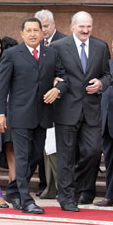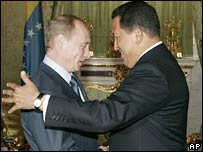The colors of the new power - Part 1
Juan Carlos Zapata has written an excellent but far too long article in this week's
Descifrado en la Calle. I'll translate chunks of it, in parts.
(Incidentally, JCZ, buddy, you're a good analyst but BOY do you need an editor! You could knock out at least 20% of the words in this article without losing any content.)
Extracts:
What will Chavez do when the contradictions at the heart of the revolution burst into the open? Because they will burst, as they burst with Luis Miquilena, who Chavez called his father in private but in private, between confidants, linked to the past. The Chavista generals knew that the old man was an obstacle to Chavez's purposes, because Chavez knew that Miquilena didn't understand him, didn't agree or approve of talk of revolution or socialism or taking apart the capitalist system, or his siding with Fidel Castro. And so he was faced down by Chavismo's left wing and, in the end, with Chávez himself.
And as they burst with Luis Alfonso Dávila, a right wing military man who traveled the country with Chávez when he was just starting to build his political project, who would chair Congress and become foreign and interior minister. After Miquilena left he also faced the leftist wing of chavismo: he made a grab for control of MVR, was picked out by the movement's vultures, cornered and defeated.
The winners were Chávez and Diosdado Cabello, and their allies. In just a few years they cleansed the movement of outmoded right-wingers - like Davila and viceadmiral Gruber Odremán, and of groups with roots in the past - like those lead by Luis Miquilena and Tobías Carrero, among others. Having cleaned house, they have become lords and masters of the revolutión. But it's obvious that ideology still separates them. While Chávez fights capitalism, Diosdado Cabello cheers it and protects it.
There is no question: the contradictions will blow into the open again because what's a stake in Venezuela is a conception of the state, of the system. How far will the allies go along with Chávez in deepening an anti-capitalist revolution? How far will they back his constitutional changes to guarantee he can perpetuate himself in the presidency?
The Bolibourgeoisie, born of the Chavez era, might claim the spaces it has won at any time - including the space to make agreements with traditional and multinacional capitalists, because nothing is more pragmatic than capital.
Neither Juan Vicente Gómez nor Pérez Jiménez nor Rómulo Betancourt would hang out at the Caracas Country Club, but they understood their tacit pact with capital. Chávez doesn't go to the Country Club and, at the same time, wants to take apart a system for coexistence that has been in place since the Republic exists, since 1830, where, according to historian Ramón J. Velásquez, the generals rule, the learned make the laws and the rich do business. Since Gómez's time, no head of state had accumulated so much power - in fact, it may not be totally crazy to affirm that Chávez has accumulated more power than Gómez.
In 1998, when the business elite ended up backing Chávez, they thought that the 1830 pact would remain intact, that the partition of powers would continue. But the last few years shows that the regime's goal is not just to break the pact - which it has already done formally - but to go beyond that and to take apart the system that underlies the pact.
"The long term objective, in the economy, is to transcend the capitalist model," said Chávez on November 12, 2004 talking to a meeting of government officials. "The capitalist economic model is inviable, impossible. We, the leaders - especially the leaders - have to be very clear about that."
This is why Chavez lumps the entire business establishment together into just one big fascist, counter-revolutionary oligarchy. And so he has taken on the challenge to dominate it and destroy it if needs be.
And yet, while he says that for now "we are not considering getting rid of private property...at this time (2004) that would be crazy...it's not the right time," and at the same time he says "nobody knows what will happen in the future," a good part of the leadership that surrounds him has very different goals: to become the new big players in the business world, to take the spot of the Polar Group, the Cisneros Group, the bankers, etc. That's the deep divide in chavismo. The major contradiction that sooner or later will burst open within the movement. And Chávez knows it. Chávez suspects it. That's why he keeps talking about Juan Vicente Gómez's treachery against Cipriano Castro and he talks about Gómez's surrender to the Caracas oligarchy.
"We must think through the creation of a new economic system. We can't do that in two or five years, that would be a lie," says Chávez. Many who listen to him think of the utopian nature of the discourse, and rather than utopias they prefer to stuff their pockets.
And so after seven years of bolivarian revolution, power has become military-political domination. The Armed Forces' High Command, the Army Command and the MVR's National Tactical Command all respond to Chávez orders, as both political and military leader, and from their orders are handed on down to the military bureaucracy, which dominates not just the armed forces but also the key structures of the government and the state. The National Assembly, the Supreme Tribunal, the National Electoral Council, the Prosecutors, the Ombudsman and the Comptroller, all see their space for action reduced until they've become mere puppets in a system with a democratic facade.
The minority of the structure is powerful, and within that minority there is the president, who accepts no decentralized political decisions from governors, ministers, parlamentarians or heads of State-owned enterprises. When the finance minister, for instance, announces a decision, he has no problem saying that the decision has been made but the president has the last word, when pro-government candidates are selected for the National Assembly, the leaders have no problem admitting that the president has the last word; when Caracas Mayor Juan Barreto announces a plan, the publicity highlights the president's name; when a little square is opened in any town in Venezuela, the mayor unveils a little plaque saying the public work is due to Hugo Chavez.
These details reflect the domination of that autarkic power, which demands of its followers that they must repeat, again and again, "fatherland or death," "with Chavez unto death," and "Chavez is the people."
The military caudillo cannot accept doubts of any kind, and therefore demands total subservience, and if this stops happening that would be a dangerous signal of a crisis. It also explains why the caudillo prefers to set up a parallel state, to set up the bolivarian schools, the Bolivarian University, the adult education missions, and why he attacks private education and limits autonomous universities: to sow feelings of personal loyalty and loyalty to the revolution. It doesn't matter that the level at the Bolivarian University or Mision Sucre fall far short of quality standards. The problem isn't quality, it's loyalty. Loyalty is proof of love for the caudillo.
But then others say: my loyalty is money.
Please comment responsibly:
|
There's more to the shooting
Katy says: This
news item from Unión Radio continues the story from my previous post. Laura Toro, the Dean of FACES College where the shooting took place, fears for her life
on campus. She claims the shooters began calling for her after the incident.
Prof. Toro says she and a colleague have been recieving death threats for days, and she linked these happenings to the decision by Venezuela's Supreme Tribunal to suspend student body elections at ULA, where chavismo was expected to lose.
If one is to believe Prof. Toro and University Pres. Rodríguez, these shootings are not random, isolated incidents. Something is brewing at ULA, something probably not unrelated to
- chavismo constantly losing university elections;
- Pres. Chávez's announcement to eliminate nation-wide University standardized admittance tests;
- the surge in the amount of weapons on the street;
- the government's violation of university autonomy; and
- the impunity in our legal system.
Please comment responsibly:
|
The pretty-well-armed revolution
 Katy says:
Katy says: This
El Universal note sent shivers down my spine. While PSF chuggers comfortably spin about Venezuela from their First-World ivory towers or their VIO offices with a view of the Potomac, they should spare a thought for university students at one of Venezuela's oldest and most prestigious institutions trying to study while dodging bullets.
With FALs now in the hands of the civilian population, is this a preview of things to come?
"The President of the University of the Andes, Lester Rodríguez, reported that two of its students were wounded today in a gunfight. Nevertheless, he claimed that 'the situation at FACES College is under control ... there is a tense calm, of course, but the situation is under control.'
One of the wounded students was identified as Alfredo Contreras, who was taken to the Integral Medial Center of the Andes University after being hit by a bullet in the leg, presumably by another student who shot him with a 9 mm. weapon.
Several students were eyewitnesses to the incident and are currently giving their accounts at the Prosecutor's Office, the university's President said to Globovisión.
Rodríguez said that he had spoken this afternoon with Lt. Cegarra, general secretary of the Mérida Governor's office, to schedule a meeting tomorrow with Gov. Florencio Porras, so they can work on a disarmament plan.
The university President stated that 'regrettably we have students bearing arms on campus. This situation is no longer sustainable, it is out of control, so it's not only infiltrated individuals anymore, now we also have students aremd with 9 mm. weapons inside the ULA.'
According to the president, there is little the university's authorities can do to control the access and the use of firearms on campus."
Please comment responsibly:
|
Everything you ever wanted to know about Argentina v. Holland...
...but were afraid to ask...
Please comment responsibly:
|
The Unforgettable Bash
This is my Tio Pepe's column in today's Universal.
The unforgettable bash
by José Toro Hardy
We Venezuelans are enjoying one of the greatest bashes of our history. Taking advantage of our swollen oil revenues, which are not the outcome of anyone's effort but rather of oil prices higher than we'd ever dreamed, we have gone on a collective consumption binge, forgetting that no society can survive if it doesn't produce.
Far from sowing the oil, as Arturo Uslar Pietri so often recommended, it seems like the governing leadership has coined a marvelous new formula to consume it directly, chugging it from the well. There's no longer any question of taking on great investments or winning markets. There's no need to worry about the feasibility of any project. Who cares? We have more money than we know what to do with.
The old sing-song about the need to be efficient and productive was just the babble of the old PDVSA, that discredited oil meritocracy that wanted to swindle Venezuelans into believing that the hydrocarbon industry is a knowledge-intensive business. None of that seems to make sense anymore. Now PDVSA belongs to everyone and therefore we all have the right to take a swing at that pińata. And not just all Venezuelans. All revolutionaries all around the world as well.
A magical new formula seems to have sprung from the government's labs. It allows us to turn oil into a sort of fascinating elixir that can be consumed directly, causing a feeling of collective happiness.
Nobody can doubt the efficiency of this new formula. Its results are out in the open. For instance, last year, thanks to the effects of this portentous beverage, Venezuela's GDP grew by 9.5%. And yet, that amazing result was achieved creating just 38,000 new jobs. So we have a mechanism that demonstrates the very high productivity of these new economic policies. I'm convinced that those who designed them should be awarded the Nobel Prize in Economics and honorary doctorates from all the best universities.
Chugging our petroleum straight out of the well, as though we're drinking milk from a cow's udder, has considerable advantages. For instance, so far this year, public spending has risen 67% from a year earlier, and in the first quarter imports totaled almost $6 billion. What more could we want?
The instant gratification our society gets is indubitable. For example, so far this year, retail sales have risen 29.8% and wholesaling has grown 51.8%. Other numbers ratify the virtues of the new model. Just in January 2006, car sales grew 112.7% compared to the same month the previous year. And that's nothing. Home appliance sales rose 136%, while textile, clothing, footwear and leather items grew 40.4%. Again, what more could we want?
Venezuelans are swimming in money. Liquidity in the hands of the public exceeds Bs.80 trillion . Who the hell cares that the Central Bank lost Bs.300 billion ($140 million) on the sale of domestic bonds aimed at mopping up excess liquidity to slow down inflation.
This society is finally shaking off all of the economists' pedantries. When it comes down to it, how does it affect us that the government grabbed over $10 billion out of the international reserves and transferred them to Fonden? In fact, to show that you can do that and much more, the government has decided to withdraw another billion dollars out of reserves to send them to a social fund. So what? Haven't the BCV directors told us that Central Banks don't go bankrupt?
The government's detractors insist on scaring us telling us that investment (public and private) is insufficient. Who cares about investing if we're all consuming like never before? Isn't the point of investing to obtain profits so you can consume more later? Well, we're already consuming more, without having to invest. Why worry?
It reminds me of an old story about a fisherman from Margarita:
"Why would I work more?" asks the fisherman.
"So you have money later on and you can retire and rest," said the gringo he was talking to.
"But that's what I'm doing now," replied the fisherman.
And where does all this leave us? Well, tomorrow will take care of itself. For now we're having a hell of a bash; it's an election year. Later on we'll have to pick up the broken glass.
Please comment responsibly:
|
Totalitarian Tendency Watch: Arepita de manteca...
...pa'mamá que da la...A press release sent out by the Ministry of Information and Communications this week reaches an absurd new low in terms of politicizing the eminently apolitical. A note on the government's commitment to encourage breastfeeding carried the headline: "The First Act of Food Sovereignty."
Apparently, breastfeeding is only considered praiseworthy if it can somehow be turned into another lego-piece in the government's indoctrination strategy.
Please comment responsibly:
|


 Chavez Reelection Blog: Katy documents the government's use of public resources for Chavez's partisan advantage.
Chavez Reelection Blog: Katy documents the government's use of public resources for Chavez's partisan advantage.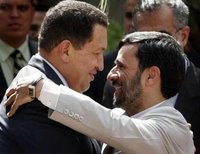
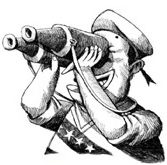
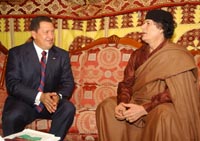
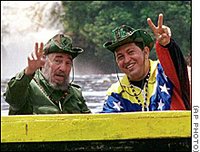
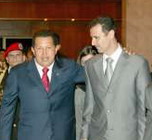
 Site feed
Site feed 